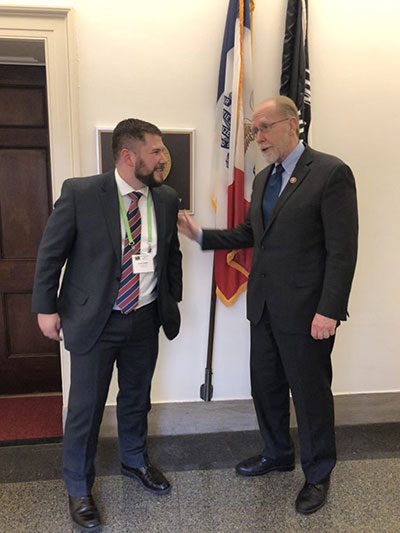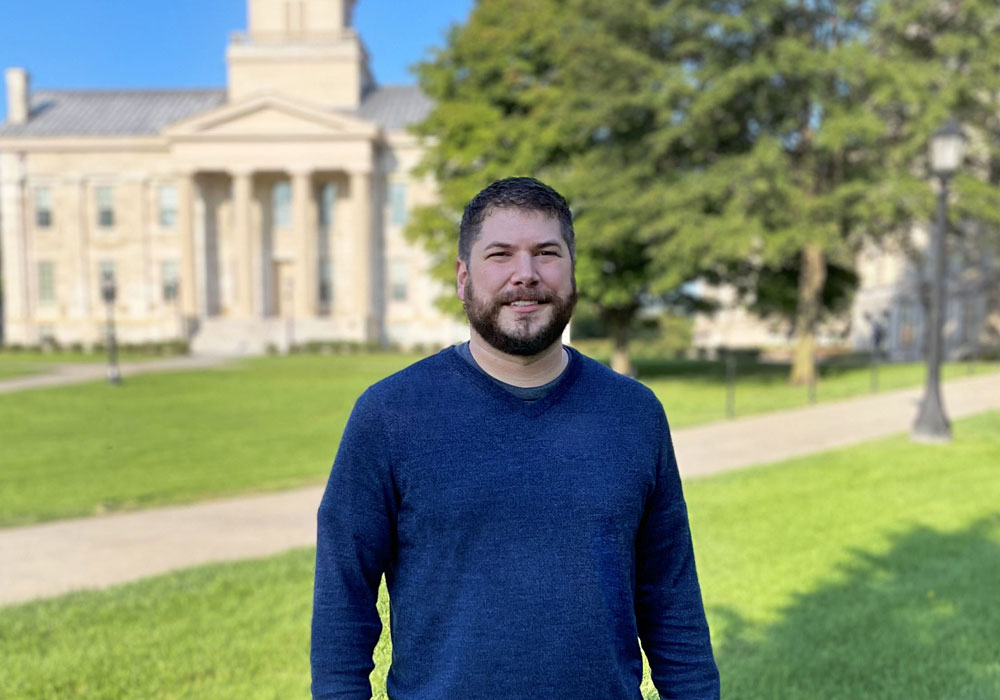
MINOT, N.D. – Following his career in the United States Air Force, Jacob Schillo felt adrift until he found connection — and a way to serve — in the biology lab at Minot State University.
“I felt as though I lost some purpose after leaving the military. I went from doing something critical to the safety and security of our nation to an environment more focused on personal growth. I found that transition difficult,” he said. “Making an impact in the lives of patients being treated for cancer was a way for me to regain that team aspect and serve people in a new capacity.”
An early genetics course taught by Heidi Super, Minot State University biology professor and medical laboratory science program coordinator, drew him into the study of genetics and cancer, an area he continues to research at the University of Iowa as a doctoral student in genetics.
“I was fascinated by the intro to the assigned textbook. I immediately wanted to read more and that’s when I knew that genetics may become a larger part of my life,” he said. “Heidi’s lab focused on leukemias which are known for complex rearrangements of genetic code. Unfortunately, this is also one of the most common forms of cancer that affect children, along with brain cancers. I find it difficult to comprehend the burden of cancer at such an early age. With this in mind, Heidi’s lab was always the right choice for me in which I felt that I could make a positive impact in the lives of those fighting such a horrible disease.”
“Jake approached me to join the lab but did so with a seriousness I’d never seen in previous students. He wanted to make sure the work would be challenging and meaningful,” Super said. “It became clear pretty quickly that Jake could think critically and work independently. He did a lot of work on weekends, due to his busy schedule and family responsibilities. He added a great deal to the atmosphere of the lab. His project continues to be one that I wish to return to in the future.”
While cancer research continues to be his focus in Iowa, Schillo continues to be a learner in many different areas, an asset he cultivated at Minot State University.
“Cancer genetics is my focus now, but I am constantly taking in literature from structural biology, molecular biology, chemistry, biochemistry, physics, physiology, and the list goes on,” he said. “I am a better scientist when I can analyze and interpret a broad range of topics and use that information within my own research goals. Having a dual degree allowed me that broader range of topic.”
Those skills enabled him to pivot and help in a different way in 2020.
“As a real example of this utility, the COVID-19 pandemic shut down most of the research labs at the University of Iowa for several months. Now again, my focus is cancer genetics, but during this shutdown I volunteered my time to help establish a testing platform for Iowa residents with suspected SARS-CoV-2 infections,” he said. “This work had nothing to do with cancer, but my ability to utilize techniques across a range of topics allowed me to transition and aid in establishing the diagnostic laboratory.”

Being named a 2021 Tillman Scholar is a testament to his well-rounded approach to learning and helping. The distinction is given to select individuals in recognition of their military service, academic passions, and desire to make an impact.
“Jake shared with me a bit of his military experience, but more than anything exuded pride for having served. His service was not simply a means to obtain an education, but he also saw the incredible value in the tuition assistance that comes from being a veteran,” Super said. “He was a serious student from the get-go and weighed carefully where his passion for science could take him.”
His experiences as a veteran led to him becoming the main force behind the creation of the Veteran Peer Advisory Program at the University of Iowa.
“Being a veteran, I could absolutely understand two common struggles,” Schillo said. “When veterans separate from the military, they often refer to losing two things, their family and their purpose. The VPA program was designed to help ease that transition back to civilian life, helping veterans find their passion and giving them the resources they need to be successful early on in the collegiate careers.”
The Fort Dodge, Iowa native spent six-and-a-half years in the U.S. Air Force, with most of that time spent at the Minot Air Force Base.
“I was taking classes through Minot State years prior to separating from the Air Force. Staying at Minot State allowed for me to continue my degree without interruption,” he said. “I think that my favorite part about MSU was the inspiring nature of the professors. From a pure funding standpoint, I think it’s incredible the research that’s being conducted within the science building with limited resources. It’s a testament to the character of the professors in that building inspiring the next generation of scientists.
“It’s the students in Cyril Moore that are going on to create vaccines, treat patients, and cure cancer. If you’re looking for a way to invest in the future of society, that’s not a bad place to look.”
From the military to Minot State to the University of Iowa, Schillo pulls all of his experiences together as he pursues his life’s work.
“The military taught me that the most important component we have are the people. Just as in the military, my job as a scientist is more about ensuring we have the right people in the right place to do something great. And I have great respect for Heidi Super and the impact that she has had on my career. In the end, I found a career in which I don’t feel like I work. I have a job in which I look forward to Monday, and that enjoyment for discovery came from my early experiences in Heidi’s lab.
“My passion for understanding the complexities of cancer and the need to develop therapeutics to better engage cancer has led to making research part of my life’s mission.”
About Minot State University
Minot State University is a public university dedicated to excellence in education, scholarship, and community engagement achieved through
rigorous academic experiences, active learning environments, commitment to public service, and a vibrant campus life.
Published: 10/12/21




